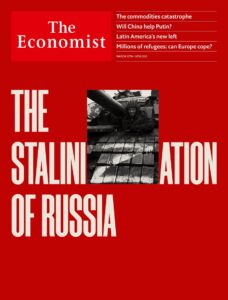 The thinking behind the assumption that the war in Ukraine may prompt an elite coup or mass protests that depose Vladimir Putin is based on a faulty reading of history, argues Vladislav Zubok, Professor of International History at the London School of Economics and the author of Collapse: The Fall of the Soviet Union.
The thinking behind the assumption that the war in Ukraine may prompt an elite coup or mass protests that depose Vladimir Putin is based on a faulty reading of history, argues Vladislav Zubok, Professor of International History at the London School of Economics and the author of Collapse: The Fall of the Soviet Union.
The Soviet Union did not collapse for the reasons Westerners like to point to: a humiliating defeat in Afghanistan, military pressure from the United States and Europe, nationalistic tensions in its constituent republics, and the siren song of democracy, he writes for Foreign Affairs:
In reality, it was misguided Soviet economic policies and a series of political missteps by Soviet leader Mikhail Gorbachev that caused the country to self-destruct. And Putin has learned a great deal from the Soviet collapse, managing to avoid the financial chaos that doomed the Soviet state despite intense sanctions. Russia today features a very different combination of resilience and vulnerability than the one that characterized the late-era Soviet Union.
To maintain … support, Putin can continue to subsidize some regions and pour billions into infrastructure and construction projects in others, Zubok adds. He can also appeal to their conservative and nostalgic sentiments—something Gorbachev could never do. Russia’s turbulent history has led most of its people to want a strong leader and consolidation of the country—not democracy, civil rights, and national self-determination. RTWT
 The Kremlin’s clampdown on independent journalism facilitated the spread of propaganda and polarized political discourse, making it easy for the state to isolate and stifle critical voices, exiled Russian journalist Mikhail Zygar told the 2022 Global Media Forum.
The Kremlin’s clampdown on independent journalism facilitated the spread of propaganda and polarized political discourse, making it easy for the state to isolate and stifle critical voices, exiled Russian journalist Mikhail Zygar told the 2022 Global Media Forum.
“The war on independent media in Russia was short and ruthless,” he said at a panel on “Shaping the Future of Journalism in Wartime,” DW reports. Though he and his fellow independent journalists had long faced harassment and intimidation from the Kremlin, he used to feel confident about the impact that their work had on the Russian public. “I was pretty sure that we had the full attention of the audience and that it would be impossible to destroy us,” he said. “But I was wrong.”
“We don’t have data from Russia,” said Zygar. The 60% of Russians that supposedly support the Kremlin’s invasion are from the 10% who were actually asked.







